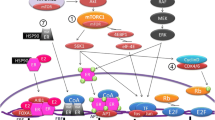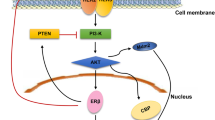Abstract
There are large-scale molecular differences between estrogen receptor (ER)-positive and ER-negative breast cancers. Endocrine therapy has become the most important treatment option for women with ER-positive breast cancer, and approximately 70% of primary breast cancers express ERα. Endocrine therapy has provided meaningful advances in breast cancer treatment and prevention. However, some patients continue to develop recurrence and die of the disease. New insights into ER biology and progress in the understanding of resistance mechanisms are generating tremendous promise for new therapeutic opportunities to target resistance and improve disease outcomes.
Similar content being viewed by others
References
Early Breast Cancer Trialists’ Collaborative Group (2005) Effects of chemotherapy and hormonal therapy for early breast cancer on recurrence and 15-year survival: an overview of the randomised trials. Lancet 365:1687–1717
Baum M, Budzar AU, Cuzick J, et al. (2002) Anastrozole alone or in combination with tamoxifen versus tamoxifen alone for adjuvant treatment of postmenopausal women with early breast cancer: first results of the ATAC randomised trial. Lancet 359:2131–2139
Coombes RC, Hall E, Gibson LJ, et al. (2004) A randomized trial of exemestane after 2 to 3 years of tamoxifen therapy in postmenopausal women with primary breast cancer. N Engl J Med 350: 1081–1092
Thurlimann B, Keshaviah A, Coates AS, et al. (2005) A comparison of letrozole and tamoxifen in postmenopausal women with early breast cancer. N Engl J Med 353:2747–2757
Yamashita H, Ando Y, Nishio M, et al. (2006) Immunohistochemical evaluation of hormone receptor status for predicting response to endocrine therapy in metastatic breast cancer. Breast Cancer 13:74–83
Herynk MH, Fuqua, SA (2004) Estrogen receptor mutations in human disease. Endocr Rev 25:869–898
Giacinti L, Claudio PP, Lopez M, et al. (2006) Epigenetic information and estrogen receptor alpha expression in breast cancer. Oncologist 11:1–8
Holst F, Stahl PR, Ruiz C, et al. (2007) Estrogen receptor alpha (ESR1) gene amplification is frequent in breast cancer. Nat Genet 39:655–660
Albertson DG (2008) Conflicting evidence on the frequency of ESR1 amplification in breast cancer. Nat Genet 40:821–822
Esquela-Kerscher A, Slack, FJ (2006) Oncomirs — microRNAs with a role in cancer. Nat Rev Cancer 6:259–269
Adams BD, Furneaux H, White BA (2007) The micro-ribonucleic acid (miRNA) miR-206 targets the human estrogen receptor-alpha (ERalpha) and represses ERalpha messenger RNA and protein expression in breast cancer cell lines. Mol Endocrinol 21:1132–1147
Kondo N, Toyama T, Sugiura H, et al. (2008) miR-206 Expression is down-regulated in estrogen receptor alpha-positive human breast cancer. Cancer Res 68:5004–5008
Osborne CK, Schiff R (2005) Estrogen-receptor biology: continuing progress and therapeutic implications. J Clin Oncol 23:1616–1622
Massarweh S, Schiff R (2007) Unraveling the mechanisms of endocrine resistance in breast cancer: new therapeutic opportunities. Clin Cancer Res 13:1950–1954
Kurokawa H, Lenferink AE, Simpson JF, et al. (2000) Inhibition of HER2/neu (erbB-2) and mitogen-activated protein kinases enhances tamoxifen action against HER2-overexpressing, tamoxifen-resistant breast cancer cells. Cancer Res 60:5887–5894
Ellis MJ, Coop A, Singh B, et al. (2001) Letrozole is more effective neoadjuvant endocrine therapy than tamoxifen for ErbB-1-and/or ErbB-2-positive, estrogen receptor-positive primary breast cancer: evidence from a phase III randomized trial. J Clin Oncol 19: 3808–3816
Gee JM, Robertson JF, Ellis IO, et al. (2001) Phosphorylation of ERK1/2 mitogen-activated protein kinase is associated with poor response to anti-hormonal therapy and decreased patient survival in clinical breast cancer. Int J Cancer 95:247–254
Tokunaga E, Kimura Y, Mashino K, et al. (2006) Activation of PI3K/Akt signaling and hormone resistance in breast cancer. Breast Cancer 13:137–144
Martin LA, Farmer I, Johnston SR, et al. (2005) Elevated ERK1/ERK2/estrogen receptor cross-talk enhances estrogen-mediated signaling during long-term estrogen deprivation. Endocr Relat Cancer 12(Suppl 1):S75–S84
Moy B, Goss PE (2006) Estrogen receptor pathway: resistance to endocrine therapy and new therapeutic approaches. Clin Cancer Res 12:4790–4793
Leary AF, Sirohi B, Johnston SR (2007) Clinical trials update: endocrine and biological therapy combinations in the treatment of breast cancer. Breast Cancer Res 9:112
Yamashita H, Nishio M, Kobayashi S, et al. (2005) Phosphorylation of estrogen receptor alpha serine 167 is predictive of response to endocrine therapy and increases postrelapse survival in metastatic breast cancer. Breast Cancer Res 7:R753–R764
Yamashita H, Nishio M, Toyama T, et al. (2008) Low phosphorylation of ER{alpha} serine 118 and high phosphorylation of ER{alpha} serine 167 improve survival in ER-positive breast cancer. Endocr Relat Cancer
Goetz MP, Rae JM, Suman VJ, et al. (2005) Pharmacogenetics of tamoxifen biotransformation is associated with clinical outcomes of efficacy and hot flashes. J Clin Oncol 23:9312–9318
Lim HS, Ju Lee H, Seok Lee K, et al. (2007) Clinical implications of CYP2D6 genotypes predictive of tamoxifen pharmacokinetics in metastatic breast cancer. J Clin Oncol 25:3837–3845
Schroth W, Antoniadou L, Fritz P, et al. (2007) Breast cancer treatment outcome with adjuvant tamoxifen relative to patient CYP2D6 and CYP2C19 genotypes. J Clin Oncol 25:5187–5193
Punglia RS, Burstein HJ, Winer EP, et al. (2008) Pharmacogenomic variation of CYP2D6 and the choice of optimal adjuvant endocrine therapy for postmenopausal breast cancer: a modeling analysis. J Natl Cancer Inst 100:642–648
Xu Y, Sun Y, Yao L, et al. (2008) Association between CYP2D6*10 genotype and survival of breast cancer patients receiving tamoxifen treatment. Ann Oncol
Kiyotani K, Mushiroda T, Sasa M, et al. (2008) Impact of CYP2D6*10 on recurrence-free survival in breast cancer patients receiving adjuvant tamoxifen therapy. Cancer Sci 99:995–999
Jin Y, Desta Z, Stearns V, et al. (2005) CYP2D6 genotype, antidepressant use, and tamoxifen metabolism during adjuvant breast cancer treatment. J Natl Cancer Inst 97:30–39
Ma CX, Adjei AA, Salavaggione OE, et al. (2005) Human aromatase: gene resequencing and functional genomics. Cancer Res 65:11071–11082
Ingle JN (2008) Pharmacogenomics of tamoxifen and aromatase inhibitors. Cancer 112:695–699
Hanash S (2004) Integrated global profiling of cancer. Nat Rev Cancer 4:638–644
Sparano JA, Paik S (2008) Development of the 21-gene assay and its application in clinical practice and clinical trials. J Clin Oncol 26:721–728
Cardoso F, Van’t Veer L, Rutgers E, et al. (2008) Clinical application of the 70-gene profile: the MINDACT trial. J Clin Oncol 26:729–735
Paik S, Shak S, Tang G, et al. (2004) A multigene assay to predict recurrence of tamoxifen-treated, node-negative breast cancer. N Engl J Med 351:2817–2826
Habel LA, Shak S, Jacobs MK, et al. (2006) A population-based study of tumor gene expression and risk of breast cancer death among lymph node-negative patients. Breast Cancer Res 8:R25
Paik S, Tang G, Shak S, et al. (2006) Gene expression and benefit of chemotherapy in women with node-negative, estrogen receptorpositive breast cancer. J Clin Oncol 24:3726–3734
Sparano JA (2006) TAILORx: trial assigning individualized options for treatment (Rx). Clin Breast Cancer 7:347–350
Author information
Authors and Affiliations
Corresponding author
About this article
Cite this article
Yamashita, H. Current research topics in endocrine therapy for breast cancer. Int J Clin Oncol 13, 380–383 (2008). https://doi.org/10.1007/s10147-008-0818-7
Received:
Published:
Issue Date:
DOI: https://doi.org/10.1007/s10147-008-0818-7




